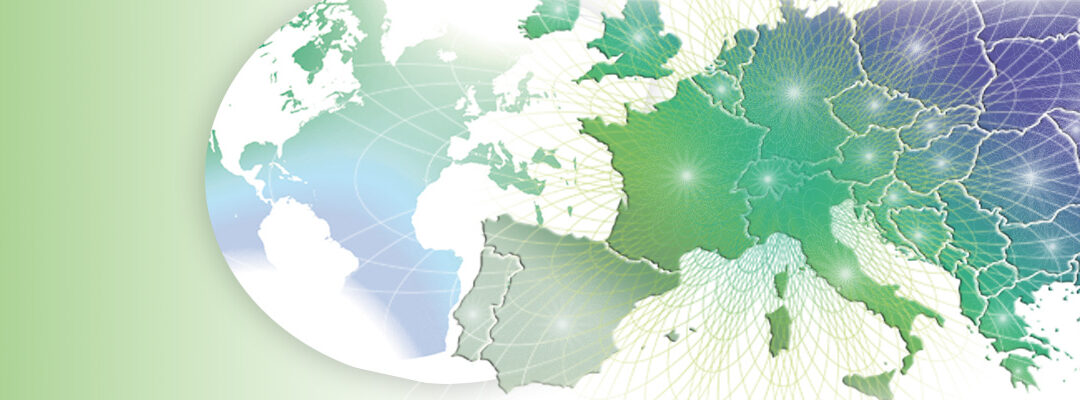
Jul 2, 2016 | Non categorizzato
Together for Europe Encounter, Reconciliation, Future Munich (Bavaria), 2nd July 2016  There is no alternative to being together “United in diversity”. This European hope is more than ever relevant. Europe must not become a fortress and build new frontiers. There is no alternative to being together. Being together in reconciled diversity is possible. The Gospel – a source of hope Jesus Christ prayed for unity and gave his life for it. This is stated in the Gospel, which for almost 2,000 years has played a key role in the culture of Europe. Jesus Christ teaches us boundless love for all people. He shows us the path of mercy and reconciliation. We can ask forgiveness and forgive one another. The Gospel of Jesus Christ is a powerful source from which we can draw hope for the future. Europe – a culture of respect and esteem The terrible experiences of two World Wars have taught us that peace is a precious gift that we must preserve. Our future must be characterised by a culture of respect and esteem for others, even for strangers. Unity is possible – Overcoming divisions We ask all Christians, especially Church leaders, to overcome the divisions. These have caused suffering, violence and injustice, and have undermined the credibility of the Gospel. As Christians we want to live together as people who are reconciled and in full communion. Our commitment We live the Gospel of Jesus Christ and bear witness to it with our words and deeds. We are pursuing the path of reconciliation and working to enable our communities, Churches, peoples and cultures to live “unity in diversity”. We meet people of different beliefs and faiths with respect, seeking dialogue with them. We are committed to building up humanity and peace in the world. We have a vision for Europe being together in a way that is stronger than fear or selfishness. We place our trust in the Holy Spirit who continually renews and gives life to the world Concluding Message – Together For Europe, Munich 2016
There is no alternative to being together “United in diversity”. This European hope is more than ever relevant. Europe must not become a fortress and build new frontiers. There is no alternative to being together. Being together in reconciled diversity is possible. The Gospel – a source of hope Jesus Christ prayed for unity and gave his life for it. This is stated in the Gospel, which for almost 2,000 years has played a key role in the culture of Europe. Jesus Christ teaches us boundless love for all people. He shows us the path of mercy and reconciliation. We can ask forgiveness and forgive one another. The Gospel of Jesus Christ is a powerful source from which we can draw hope for the future. Europe – a culture of respect and esteem The terrible experiences of two World Wars have taught us that peace is a precious gift that we must preserve. Our future must be characterised by a culture of respect and esteem for others, even for strangers. Unity is possible – Overcoming divisions We ask all Christians, especially Church leaders, to overcome the divisions. These have caused suffering, violence and injustice, and have undermined the credibility of the Gospel. As Christians we want to live together as people who are reconciled and in full communion. Our commitment We live the Gospel of Jesus Christ and bear witness to it with our words and deeds. We are pursuing the path of reconciliation and working to enable our communities, Churches, peoples and cultures to live “unity in diversity”. We meet people of different beliefs and faiths with respect, seeking dialogue with them. We are committed to building up humanity and peace in the world. We have a vision for Europe being together in a way that is stronger than fear or selfishness. We place our trust in the Holy Spirit who continually renews and gives life to the world Concluding Message – Together For Europe, Munich 2016
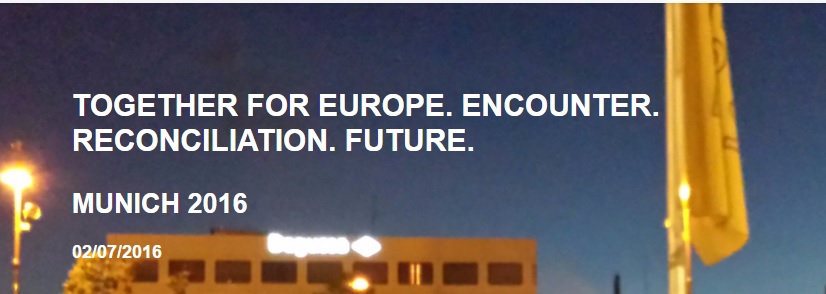
Jul 2, 2016 | Non categorizzato

Streaming in German, English, French, Italian, Portuguese, Spanish and Hungarian. After 6 PM streaming only in the original language until 10 PM.
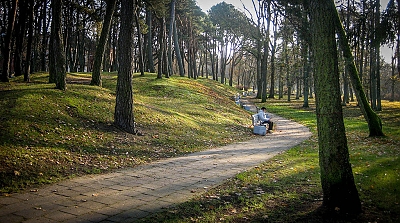
Jun 30, 2016 | Non categorizzato
 “Urged by the stances of our leaders – remember, for example, the establishment of the Day of Prayer for the Protection of Creation (Patriarch Demetrio, 1989), the Evangelical Climate Initiative (2006) and the encyclical Laudato Si’ (Pope Francis, 2015); In recognition of the debt that we, the people of ancient Christian tradition, have contracted with the poor of the Earth and future generations due to the pollution of the Biosphere, mainly caused by our irresponsible progress in the recent past centuries; Aware that the alarm for climate change may become an opportunity for a novel integral development of all people; We Christians, open to the contribution of all people regardless of their beliefs, commit ourselves in prayer and action to avoid the destruction of nature and a new world war, and endorse the following ten challenges:
“Urged by the stances of our leaders – remember, for example, the establishment of the Day of Prayer for the Protection of Creation (Patriarch Demetrio, 1989), the Evangelical Climate Initiative (2006) and the encyclical Laudato Si’ (Pope Francis, 2015); In recognition of the debt that we, the people of ancient Christian tradition, have contracted with the poor of the Earth and future generations due to the pollution of the Biosphere, mainly caused by our irresponsible progress in the recent past centuries; Aware that the alarm for climate change may become an opportunity for a novel integral development of all people; We Christians, open to the contribution of all people regardless of their beliefs, commit ourselves in prayer and action to avoid the destruction of nature and a new world war, and endorse the following ten challenges:
- To convert in projects of peace the weapons disseminated around us, especially the atomic ones
- To increase research in the Biosphere science and its applications, so that they can become safer
- To differentiate and recycle household and industrial waste
- To intensify the use of renewable energy sources
- To plan reforestation programs and forest policies at all levels (from local to international)
- To strengthen ecological transports, such as electric and hydrogen based cars, and local public transport initiatives
- To increasingly allocate hydrocarbons to the production of substances and materials useful for humanity rather than using them for burning
- To avoid the waste of precious common goods such as water and food, ensuring a more equitable distribution
- To respect other living beings, recognizing that everything is in relation in the planet
- To transform our homes, our neighbourhoods and cities into places of beauty, harmony and fraternity
How?
- Adhering to our leaders’ stances and promoting complying laws, such as the Paris Agreement
- Promoting initiatives in accordance with the “Golden Rule” and joining the initiatives of other people, regardless of their belief
- Asking for advice to our communities and cooperating with them in promoting actions to save nature and humanity
We can achieve these goals if we start now, before it is too late. In particular, we can help ensure that greenhouse gases do not exceed the safety levels, as foreseen by the Paris Agreement and recommended by the scientific community.” EcoOne (www.ecoone.org/) Civiltà dell’amore (www.civiltadellamore.org/)
Jun 28, 2016 | Non categorizzato, Word of
World of Life audio mp3 Giving an amnesty to one another, forgiving one another totally and each day, we can grow in the kindness that mirrors God’s mercy to us. There is nothing more wonderful than hearing someone say to you: ‘I love you.’ When someone loves us we don’t feel alone, we walk secure, we are able also to face difficulties and critical situations. If then our being loved becomes mutual, hope and trust are reinforced, and we feel protected. We all know that children, to grow well, need to be surrounded by an environment that is full of love, and to have someone who loves them. But this is true at any age. For this reason the Word of Life invites us to be ‘kind’ to one another, which is to say to love one another, and it gives God himself as a model. It is precisely his example that reminds us that loving one another is not mere sentiment. It is an extremely concrete and demanding ‘desire for the good of the other’. In Jesus God has come close to the sick and the poor, has felt compassion for the crowds, has had mercy on sinners, and has forgiven those who crucified him. For us, too, wanting the good of others means listening to them, showing them sincere attention, sharing their joys and trials, taking care of them, walking with them along their way. The other person is never a stranger, but a brother or sister who belongs to me, who I wish to serve. The exact opposite of what happens when we see others as rivals, competitors, enemies, to the point of wanting their harm, to the point of crushing them, even eliminating them, as sadly we are told in the news happens day by day. Even though we may not go so far, don’t we also accumulate grudges, distrust, hostility or simple indifference towards persons who have hurt us or who we find unpleasant or who do not belong to our social circle? Wanting the good of one another, the Word of Life teaches us, means following the path of mercy, ready to forgive one another every time we slip up. Talking of this, Chiara Lubich tells us about the experience at the beginning of her new Christian community. In order to put Jesus’s command into practice, she and her first companions made a pact of mutual love. And yet, despite this, ‘especially in the early times it was not always easy for a group of girls to live the love radically. We were people like anyone else, even if we were sustained by a special gift of God and, among us, on our relationships, dust could gather and unity could weaken. This is what happened, for example, when we realized the shortcomings, the imperfections, of the others and we judged them, so that the current of mutual love grew cold. ‘In reaction to this situation one day we thought would make pact among us that we called the “pact of mercy”. We decided every morning to see each neighbour we met – in our focolare house, at school, at work and so on – as new, as really new, without remembering at all the other’s flaws, the other’s defects, but covering everything with love. It was a matter of meeting everyone with this complete amnesty in our hearts, with this universal pardon. It was a powerful commitment, taken by all of us together, that helped us always to be the first in loving in imitation of God who is merciful, who forgives and forgets.1 A pact of mercy! Could not this be a way of growing in kindness? Fabio Ciardi 1 Love of neighbour, Talk given to Muslim friends, Castel Gandolfo, 1 November 2002.
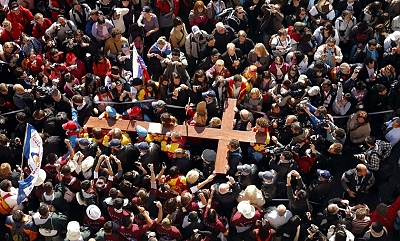
Jun 26, 2016 | Non categorizzato
 Jesus Forsaken Highest Expression of the Father’s Mercy Jesus Christ reveals the true face of God (see MV, 1), the image of the Father, his expression, his glory, his beauty, the beauty of his love (see Jn 14:8-9). By accomplishing the Pasqual Mystery, Jesus conquers suffering, sin and death, and transforms everything into mercy (see Rm 5:20). God became man to love,” Chiara Lubich says, “not only with Divine Love, but also with Suffering. He took upon Himself “all the sufferings of the world, all the disunity of the universe and made it all: Love, God!” Co vered in our sins, He renders the suffering, love; He translates misery into Mercy (misericordia).” In a letter from 1945 Chiara admits: “I also fall, often, always. But when I lift my gaze to Him and see Him there, incapable of revenge, since He is nailed to the cross because of His boundless love, I let myself be caressed by His Infinite Mercy and I know it’s the only thing that must win out in me. What good would it do Him to be infinitely Merciful? What good would it do Him if it were not for our sins?” And with abandon Chiara exclaims: “I would like to bear witness to the world that Jesus Forsaken has filled every void, enlightened every darkness, accompanied every loneliness, annulled every suffering and cancelled every sin.” These are a few cardinal points of Chiara Lubich’s in a nutshell seen from the standpoint of mercy which this Holy Year invites us to consider. We can’t end without a brief mention of Mary, Mother of Mercy and Mother of the Work founded by Chiara and named by her “Work of Mary”. Chiara writes: “A mother never stops loving the son when he’s bad, she never stops waiting for him if he’s far away, she never desires anything but to find him again, forgive him, take him into her arms – because a mother’s love is scented with mercy. (…) A mother’s love is by its very nature stronger than death. (…) Well, then, if this is what the love of ordinary mothers is like, imagine what the love of Mary is like, the human-Divine Mother of a boy who was God, and spiritual Mother us all ! (…) But God deposited his whole design for humanity in Mary (see Lk 1:49): In Mary he reveals all of his Mercy for humanity.” Source: Centro Chiara Lubich Part One: Mercy in the Spirituality of Chiara Lubich Part Two: Chiara Lubich: Love of Neighbour & the Works of Mercy Complete text by Alba Sgariglia (Italian)
Jesus Forsaken Highest Expression of the Father’s Mercy Jesus Christ reveals the true face of God (see MV, 1), the image of the Father, his expression, his glory, his beauty, the beauty of his love (see Jn 14:8-9). By accomplishing the Pasqual Mystery, Jesus conquers suffering, sin and death, and transforms everything into mercy (see Rm 5:20). God became man to love,” Chiara Lubich says, “not only with Divine Love, but also with Suffering. He took upon Himself “all the sufferings of the world, all the disunity of the universe and made it all: Love, God!” Co vered in our sins, He renders the suffering, love; He translates misery into Mercy (misericordia).” In a letter from 1945 Chiara admits: “I also fall, often, always. But when I lift my gaze to Him and see Him there, incapable of revenge, since He is nailed to the cross because of His boundless love, I let myself be caressed by His Infinite Mercy and I know it’s the only thing that must win out in me. What good would it do Him to be infinitely Merciful? What good would it do Him if it were not for our sins?” And with abandon Chiara exclaims: “I would like to bear witness to the world that Jesus Forsaken has filled every void, enlightened every darkness, accompanied every loneliness, annulled every suffering and cancelled every sin.” These are a few cardinal points of Chiara Lubich’s in a nutshell seen from the standpoint of mercy which this Holy Year invites us to consider. We can’t end without a brief mention of Mary, Mother of Mercy and Mother of the Work founded by Chiara and named by her “Work of Mary”. Chiara writes: “A mother never stops loving the son when he’s bad, she never stops waiting for him if he’s far away, she never desires anything but to find him again, forgive him, take him into her arms – because a mother’s love is scented with mercy. (…) A mother’s love is by its very nature stronger than death. (…) Well, then, if this is what the love of ordinary mothers is like, imagine what the love of Mary is like, the human-Divine Mother of a boy who was God, and spiritual Mother us all ! (…) But God deposited his whole design for humanity in Mary (see Lk 1:49): In Mary he reveals all of his Mercy for humanity.” Source: Centro Chiara Lubich Part One: Mercy in the Spirituality of Chiara Lubich Part Two: Chiara Lubich: Love of Neighbour & the Works of Mercy Complete text by Alba Sgariglia (Italian)
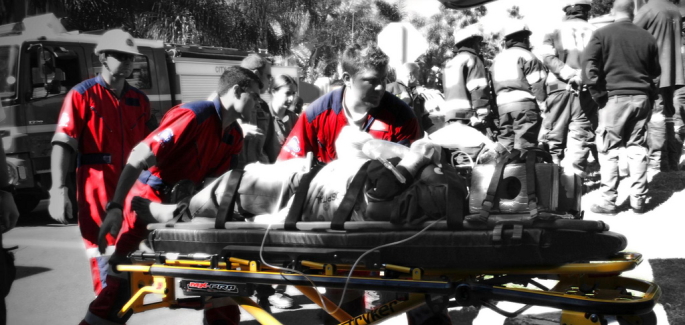
Jun 22, 2016 | Non categorizzato
 To New Life I’m a doctor working in emergency services. One morning I got called to help an elderly man who wasn’t feeling well. He was living in the midst of a lot of disorder, crushed by the death of his only son under mysterious circumstances. When I looked at his documents I realized that during the Communist Regime he had done a lot of evil things to people. I put aside all my judgements and tried to help that suffering man in front of me who was in need of affection. Beyond it all, now, for me, he was a neighbour that Jesus was inviting me to love. He spoke to me often of his past whenever I went to visit him at the hospital. Sometimes it was hard for me to listen to him, but when I was able to tell him about my own faith, I saw hope switch on in the man: It was as if he was being born to new life.” M. U. (Czech Republic) The Contract “I’m in charge of sales at the business I work for. We were competing for the contract with a major supplier and we had all the credentials to get it: design, price appeal . . . But to get the contract we would have to pay a bribe. Another Christian and I decided not to continue with the deal even at the cost of losing a significant percentage of that month’s sales. But the following month sales exceeded projections and covered the previous deficits. For us it seemed like a confirmation that it always pays to trust God. J. P. (Panama) The Translation “I had to finish a translation before the end of the evening. It was to be used for one of the presentations at a conference. Then, the telephone rang. It was a friend telling me that he needed my help right away, and it was urgent. I assured him I would help him. Only that when I received the text of the letter he wanted me to work on, I saw that there were certain technical terms that turned out to be difficult for me to translate. Only with the help of internet and several telephone calls to specialists in his field was I able to finish the translation for him, even though it was at the cost of my own work. Still, I was at peace for having helped my friend. At that point, I telephoned the association that had assigned me the translation, to explain that I would send it them on the day after, thinking that I could stay up all night and work on it. But they replied: “You can sleep soundly. That presentation has been postponed.” T. M. (Slovak Republic)
To New Life I’m a doctor working in emergency services. One morning I got called to help an elderly man who wasn’t feeling well. He was living in the midst of a lot of disorder, crushed by the death of his only son under mysterious circumstances. When I looked at his documents I realized that during the Communist Regime he had done a lot of evil things to people. I put aside all my judgements and tried to help that suffering man in front of me who was in need of affection. Beyond it all, now, for me, he was a neighbour that Jesus was inviting me to love. He spoke to me often of his past whenever I went to visit him at the hospital. Sometimes it was hard for me to listen to him, but when I was able to tell him about my own faith, I saw hope switch on in the man: It was as if he was being born to new life.” M. U. (Czech Republic) The Contract “I’m in charge of sales at the business I work for. We were competing for the contract with a major supplier and we had all the credentials to get it: design, price appeal . . . But to get the contract we would have to pay a bribe. Another Christian and I decided not to continue with the deal even at the cost of losing a significant percentage of that month’s sales. But the following month sales exceeded projections and covered the previous deficits. For us it seemed like a confirmation that it always pays to trust God. J. P. (Panama) The Translation “I had to finish a translation before the end of the evening. It was to be used for one of the presentations at a conference. Then, the telephone rang. It was a friend telling me that he needed my help right away, and it was urgent. I assured him I would help him. Only that when I received the text of the letter he wanted me to work on, I saw that there were certain technical terms that turned out to be difficult for me to translate. Only with the help of internet and several telephone calls to specialists in his field was I able to finish the translation for him, even though it was at the cost of my own work. Still, I was at peace for having helped my friend. At that point, I telephoned the association that had assigned me the translation, to explain that I would send it them on the day after, thinking that I could stay up all night and work on it. But they replied: “You can sleep soundly. That presentation has been postponed.” T. M. (Slovak Republic)

 There is no alternative to being together “United in diversity”. This European hope is more than ever relevant. Europe must not become a fortress and build new frontiers. There is no alternative to being together. Being together in reconciled diversity is possible. The Gospel – a source of hope Jesus Christ prayed for unity and gave his life for it. This is stated in the Gospel, which for almost 2,000 years has played a key role in the culture of Europe. Jesus Christ teaches us boundless love for all people. He shows us the path of mercy and reconciliation. We can ask forgiveness and forgive one another. The Gospel of Jesus Christ is a powerful source from which we can draw hope for the future. Europe – a culture of respect and esteem The terrible experiences of two World Wars have taught us that peace is a precious gift that we must preserve. Our future must be characterised by a culture of respect and esteem for others, even for strangers. Unity is possible – Overcoming divisions We ask all Christians, especially Church leaders, to overcome the divisions. These have caused suffering, violence and injustice, and have undermined the credibility of the Gospel. As Christians we want to live together as people who are reconciled and in full communion. Our commitment We live the Gospel of Jesus Christ and bear witness to it with our words and deeds. We are pursuing the path of reconciliation and working to enable our communities, Churches, peoples and cultures to live “unity in diversity”. We meet people of different beliefs and faiths with respect, seeking dialogue with them. We are committed to building up humanity and peace in the world. We have a vision for Europe being together in a way that is stronger than fear or selfishness. We place our trust in the Holy Spirit who continually renews and gives life to the world Concluding Message – Together For Europe, Munich 2016
There is no alternative to being together “United in diversity”. This European hope is more than ever relevant. Europe must not become a fortress and build new frontiers. There is no alternative to being together. Being together in reconciled diversity is possible. The Gospel – a source of hope Jesus Christ prayed for unity and gave his life for it. This is stated in the Gospel, which for almost 2,000 years has played a key role in the culture of Europe. Jesus Christ teaches us boundless love for all people. He shows us the path of mercy and reconciliation. We can ask forgiveness and forgive one another. The Gospel of Jesus Christ is a powerful source from which we can draw hope for the future. Europe – a culture of respect and esteem The terrible experiences of two World Wars have taught us that peace is a precious gift that we must preserve. Our future must be characterised by a culture of respect and esteem for others, even for strangers. Unity is possible – Overcoming divisions We ask all Christians, especially Church leaders, to overcome the divisions. These have caused suffering, violence and injustice, and have undermined the credibility of the Gospel. As Christians we want to live together as people who are reconciled and in full communion. Our commitment We live the Gospel of Jesus Christ and bear witness to it with our words and deeds. We are pursuing the path of reconciliation and working to enable our communities, Churches, peoples and cultures to live “unity in diversity”. We meet people of different beliefs and faiths with respect, seeking dialogue with them. We are committed to building up humanity and peace in the world. We have a vision for Europe being together in a way that is stronger than fear or selfishness. We place our trust in the Holy Spirit who continually renews and gives life to the world Concluding Message – Together For Europe, Munich 2016



